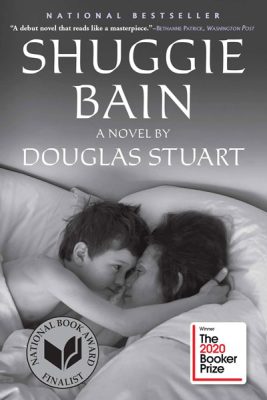‘Shuggie Bain’ Offers a Trip to Glasgow Readers Won’t Soon Forget
Review An assessment or critique of a service, product, or creative endeavor such as art, literature or a performance.
 Edinburgh has Trainspotting, a bleak tale of young men fighting to get through each day in the city’s dour underside. Glasgow, an hour or so to the west, has Shuggie Bain.
Edinburgh has Trainspotting, a bleak tale of young men fighting to get through each day in the city’s dour underside. Glasgow, an hour or so to the west, has Shuggie Bain.
Shuggie Bain didn’t so much get published as it exploded. Coming out in 2020, it tells the tale of a boy growing up in the gloomy housing projects of Glasgow in the ‘80s. His mother Agnes is an alcoholic, spending much of the family’s meager earnings on cheap cans of lager. His father is not around. Shuggie’s older siblings aim to put some distance between themselves and their dismal home base.
And so Shuggie, who is gay, grows up more or less alone.
Douglas Stuart wrote the novel, which borrows from his own challenging childhood in the housing projects of Glasgow, where he was raised by a single mother who battled alcohol.
Stuart had success in fashion, moving to New York in his mid 20s, and working for Calvin Klein, Banana Republic and other notable design brands, before his writing career took off.
If a book could emit a color, Shuggie Bain’s is gray. The novel begins with Shuggie about to start a shift at the deli. “The day was flat,” it reads. “That morning his mind had abandoned him and left his body wandering down below. The empty body went listlessly through its routine, pale and vacant-eyed under the fluorescent strip lights, as his soul floated above the aisles and thought only of tomorrow. Tomorrow was something to look forward to.”
Stuart writes of his, and Shuggie’s, hometown: “Rain was the natural state of Glasgow. It kept the grass green and the people pale and bronchial.”
Shuggie Bain was, by all counts, a smash. The book won the Booker Prize, given to the best novel written in English, in 2020, defeating the likes of Diane Cook’s The New Wilderness, Avni Doshi’s Burnt Sugar, and three other novels. The Booker is a big deal.
Readers meet Shuggie’s mother as chapter two begins. “Agnes Bain pushed her toes into the carpet and leaned out as far as she could into the night air,” it reads. “The damp wind kissed her flushed neck and pushed down inside her dress. It felt like a stranger’s hand, a sign of living, a reminder of life. With a flick she watched her cigarette dout fall, the glowing embers dancing sixteen floors down to the dark forecourt. She wanted to show the city this claret velvet dress. She wanted to feel a little envy from strangers, to dance with men who held her proud and close. Mostly she wanted to take a good drink, to live a little.”
“Dout” looks like a typo, but it’s not. My online dictionary defines dout as to put out, extinguish. In this case it is a spent cigarette.
Shuggie Bain is full of “Weegie” colloquialisms such as dout. “The auld Glasgow jakey was a dying breed,” Stuart writes. When absentee father Shug turns up at the apartment, he is criticized for “flicking at the wean,” which I took to mean striking a child.
Over time, you start to learn the language, or at least put forth your best guess.
Reviews for Shuggie Bain are glorious. The Wall Street Journal said, “Mr. Stuart vividly inhabits the city’s singular ‘Weegie’ dialect and vocabulary…It’s the obstinate Bain pride that prevents this novel from becoming a wallow in victimhood and gives it its ruined dignity.”
Kirkus Review likened Shuggie Bain to Trainspotting. “The way Irvine Welsh’s Trainspotting carved a permanent place in our heads and hearts for the junkies of late 1980s Edinburgh, the language, imagery and story of fashion designer Stuart’s debut novel apotheosizes the life of the Bain family in Glasgow…The emotional truth embodied here will crack you open. You will never forget Shuggie Bain. Scene by scene, this book is a masterpiece.”
A sophomore slump for the wunderkind author may have seemed inevitable. After all, Welsh followed Trainspotting with Marabou Stork Nightmares, which I’m guessing you never heard of, much less read.
But Stuart had other plans. His follow-up is Young Mungo, which is also set in a grim Glasgow housing project, and tells the story of Mungo and James, a Protestant and a Catholic. They should be enemies, but they fall in love.
The book came out in 2022. Shuggie Bain has averaged a staggering 4.31, out of 5, on GoodReads, with some 140,000 readers weighing in. Young Mungo does a wee bit better at 4.38.
As readers and critics are saying with great passion, Douglas Stuart has true talent. Fashion design’s loss is modern literature’s gain. You may not like the Glasgow that Stuart takes you on a trip to with his novels, but you’ll be glad you made the voyage.
Journalist Michael Malone lives in Hawthorne with his wife and two children.

Examiner Media – Keeping you informed with professionally-reported local news, features, and sports coverage.
